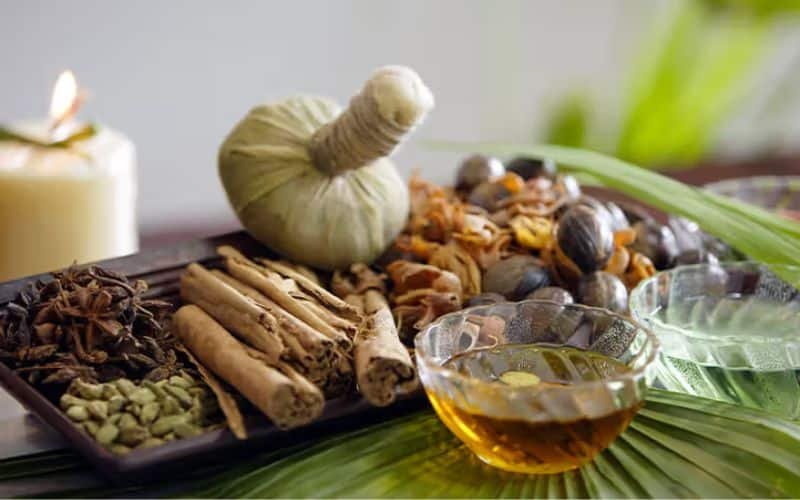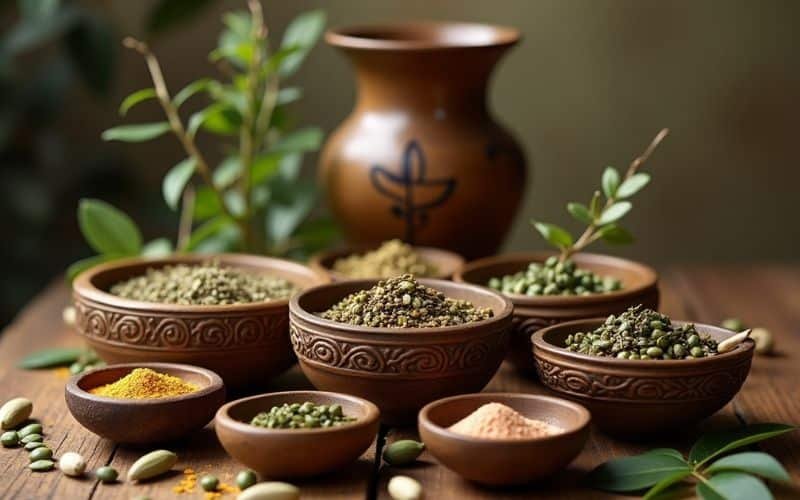No products in the cart.
Return To ShopAyurvedic Herbs for Weight Gain – Natural & Proven Remedies
Gaining weight might seem like a dream for many, especially those struggling with low appetite, fast metabolism, or stress-induced weight loss. While high-calorie diets and mass gainers flood the market, they often lack long-term safety and holistic nourishment. This is where Ayurvedic herbs for weight gain offer a time-tested, natural alternative. Rooted in ancient Indian wisdom, these herbs not only support weight gain but also enhance digestion, nutrient absorption, and energy levels. Whether you’re underweight due to health issues or looking to gain lean muscle, Ayurveda provides a sustainable, side-effect-free approach.
What Makes Ayurvedic Herbs Effective for Weight Gain?
Ayurveda focuses on balancing the body’s three doshas—Vata, Pitta, and Kapha—to maintain overall health. People with dominant Vata dosha are often thin, with fast metabolism and poor nutrient retention. Ayurvedic herbs help by:
- Improving Agni (digestive fire) to boost metabolism and absorption.
- Enhancing appetite naturally without stimulants.
- Rebuilding dhatus (tissues) to increase healthy weight.
- Reducing stress, which is often a hidden cause of weight loss.
Unlike synthetic supplements, these herbs nourish both body and mind, making the weight gain process balanced and healthy.
Top Ayurvedic Herbs for Weight Gain

Ashwagandha (Withania somnifera)
- Classification:
- Rasa: Tikta (bitter), Kashaya (astringent)
- Guna: Laghu (light), Snigdha (unctuous)
- Virya: Ushna (hot)
- Vipaka: Madhura (sweet)
- Rasa: Tikta (bitter), Kashaya (astringent)
- Mechanism of Action: Ashwagandha is an adaptogen that reduces cortisol levels, supports muscle growth, and enhances stamina. It directly supports anabolic processes in the body.
- Dosage: 3–6g/day in powder form with warm milk or 500mg capsules twice daily.
- Precautions: Avoid during pregnancy. May interact with sedatives.
- Scientific Insight: A 2015 study in the Journal of the International Society of Sports Nutrition found Ashwagandha significantly increased muscle mass and strength in healthy adults.
Shatavari (Asparagus racemosus)
- Classification:
- Rasa: Madhura (sweet), Tikta
- Guna: Guru (heavy), Snigdha
- Virya: Shita (cool)
- Vipaka: Madhura
- Rasa: Madhura (sweet), Tikta
- Mechanism of Action: Known for hormonal balance in women, Shatavari helps with appetite stimulation and tissue building, especially in underweight females.
- Dosage: 3–6g/day in powder form or 500mg capsules twice daily.
- Precautions: Use cautiously in those with estrogen-sensitive conditions.
- Reference: Used traditionally to increase lactation and body weight post-pregnancy in Ayurvedic postnatal care.
Yashtimadhu (Licorice Root)
- Classification:
- Rasa: Madhura
- Guna: Guru, Snigdha
- Virya: Shita
- Vipaka: Madhura
- Rasa: Madhura
- Mechanism of Action: Improves digestion and reduces acidity, making food absorption more effective. Also soothes inflammation in the gut lining.
- Dosage: 1–2g/day in powder or decoction form.
- Precautions: Avoid in hypertensive individuals; can raise blood pressure if overused.
- Scientific Support: Contains glycyrrhizin, which promotes mucosal healing and appetite enhancement.
Safed Musli (Chlorophytum borivilianum)
- Classification:
- Rasa: Madhura
- Guna: Guru, Snigdha
- Virya: Shita
- Vipaka: Madhura
- Rasa: Madhura
- Mechanism of Action: Boosts stamina, sexual health, and testosterone, aiding in muscle mass gain and recovery.
- Dosage: 5–10g/day in powder form or 500mg capsule twice daily.
- Precautions: Generally safe; consult a doctor if on hormonal medication.
- Evidence: Shown to increase anabolic activity and physical performance in clinical trials.
Vidarikand (Pueraria tuberosa)
- Classification:
- Rasa: Madhura
- Guna: Guru, Snigdha
- Virya: Shita
- Vipaka: Madhura
- Rasa: Madhura
- Mechanism of Action: Acts as a rasayana (rejuvenator), nourishing all dhatus and supporting fat and muscle tissue development.
- Dosage: 3–6g/day in churna (powder) form.
- Precautions: Avoid in case of estrogen-sensitive disorders.
- Textual Support: Mentioned in Bhavaprakasha as a tonic for weight gain and tissue replenishment.
Gokshura (Tribulus terrestris)
- Classification:
- Rasa: Madhura, Tikta
- Guna: Laghu, Snigdha
- Virya: Shita
- Vipaka: Madhura
- Rasa: Madhura, Tikta
- Mechanism of Action: Improves testosterone levels and promotes lean muscle gain. Supports urinary and reproductive health as well.
- Dosage: 250–500mg capsule twice daily or 3g powder daily.
- Precautions: Avoid during menstruation or pregnancy unless advised.
- Research Insight: Popular among athletes as a natural testosterone booster with positive impact on muscle recovery.
Brahmi (Bacopa monnieri)
- Classification:
- Rasa: Tikta
- Guna: Laghu
- Virya: Shita
- Vipaka: Madhura
- Rasa: Tikta
- Mechanism of Action: Reduces anxiety and stress-induced weight loss. Improves sleep and cognitive function, indirectly supporting weight gain.
- Dosage: 300–500mg capsules or 3g powder per day.
- Precautions: May cause mild digestive upset initially.
- Studies: Research shows Brahmi reduces stress markers like cortisol, which can otherwise hinder healthy weight gain.
Ayurvedic Diet and Lifestyle Tips for Better Results

To get the best from these herbs, integrate Ayurvedic dietary principles:
- Eat nourishing foods: Ghee, milk, rice, dates, almonds, and lentils.
- Use herbs with warm milk or ghee for better absorption (Anupana).
- Avoid dry, light, or spicy foods that aggravate Vata.
- Practice Abhyanga (warm oil massage) to calm the nervous system and improve nutrient assimilation.
- Prioritize rest and relaxation: Good sleep helps build ojas (vital energy).
How Long Do Ayurvedic Herbs Take to Show Results?
Results depend on dosha constitution, age, stress levels, and diet. Generally:
- Vata types (thin, anxious): May need 6–8 weeks.
- Pitta types (moderate build, intense): 4–6 weeks.
- Kapha types (sturdy build): May gain slower but steadier.
Patience and consistency are key in Ayurveda.
Are There Any Side Effects or Who Should Avoid These Herbs?
Most Ayurvedic herbs are safe when used correctly, but:
- Pregnant and lactating women swould consult a doctor first.
- People with chronic conditions (e.g., hypertension, liver disorders) must be cautious.
- Always begin with a small dose to check for allergic reactions.
- Consult an Ayurvedic practitioner to tailor herbs to your constitution and current imbalances.
Conclusion
If you’re struggling to gain weight and looking for a gentle, sustainable approach, Ayurvedic herbs for weight gain offer a powerful solution rooted in centuries of wisdom. From Ashwagandha to Shatavari and Safed Musli, these herbs not only increase weight but also build strength, immunity, and mental resilience.
Consistency, personalized dosages, and a sattvic lifestyle are crucial to get the best results.
FAQs
Can Ayurveda help with weight gain for underweight women?
Yes. Herbs like Shatavari, Ashwagandha, and Yashtimadhu are especially beneficial for women, supporting hormonal balance, digestion, and appetite.
Which is better: Ashwagandha or Shatavari for weight gain?
Ashwagandha is ideal for stress-related weight loss and muscle gain, while Shatavari is more suitable for hormonal balance and female reproductive health. Both can be used together.
How can I gain weight fast using Ayurvedic methods?
Focus on warm, nourishing meals, stress-free lifestyle, regular sleep, and supportive herbs like Ashwagandha, Safed Musli, and Vidarikand. Avoid cold, dry, or processed foods.









Add comment